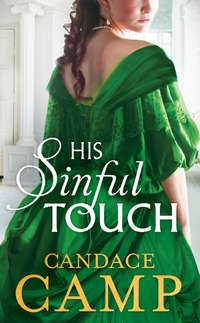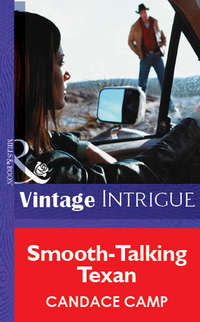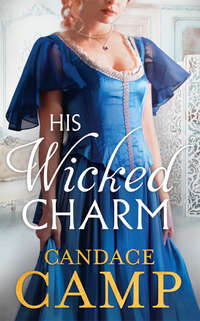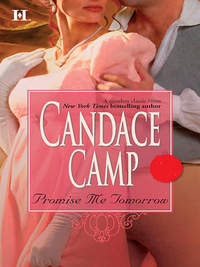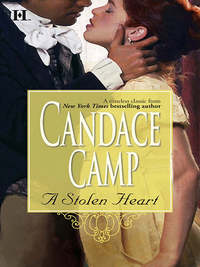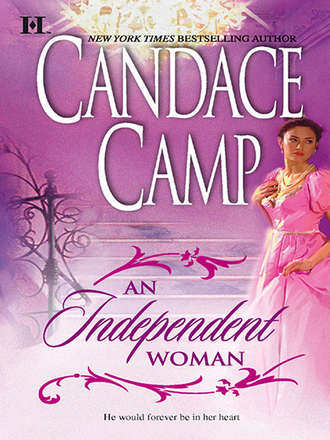
Полная версия
An Independent Woman
Nicholas winced. “I should think so. That sounds more like torture than travel.”
“Yes, and all the more so given that Aunt Lilith kept reminding me of my good fortune in being given the opportunity to broaden my horizons with them.”
“No good deed is left unheralded with them,” Nicholas agreed.
“It is so good to talk to you!” Juliana blurted out. “No one else would understand exactly how it was. How obligated one was made to feel for every mouthful of food and every stitch of clothing.”
“And how ungrateful you were for the wonderful opportunity of being allowed to associate with them,” he added.
“Just so.” Juliana smiled at him.
It was odd, she thought, that she should feel so instantly comfortable with him again, as if all the years that had separated them meant nothing. He was once again Nicky, her protector against Crandall’s mean tricks and bullying tactics, her confidant and friend.
And yet, at the same time, she was very aware of how different it all was. They were no longer children. He was a man now, large and hard and almost overpoweringly masculine. Being swept around the room in his arms was a far cry from sitting beside him on the bank of the brook, dangling their bare feet in the water. There was an elemental excitement in being so close to him, feeling his hand spread upon her waist. She could not help but think that he was virtually a stranger to her now, someone whose thoughts and deeds she had no knowledge of, whose past fifteen years were a mystery to her.
The music finally swept to a close. They stopped and stepped apart. Juliana looked up at Nicholas. She was a little breathless, and she knew it was not just from the exertion of dancing.
He offered her his arm, and they walked back to where Mrs. Thrall sat waiting for them. Juliana saw with a flicker of irritation that Clementine now stood with her mother. The girl was the picture of English beauty—dainty and dimpled in her demure white ball gown, blue-eyed and blond-haired, her dewy complexion touched with soft pink color along her cheeks.
Men were drawn to her china-doll loveliness, and Clementine had achieved a certain success this Season. However, she had not yet caught the eye of any titled gentleman, and Juliana suspected that she and her mother were hoping to correct that omission right now. Mrs. Thrall had obviously been gleeful at meeting Lord Barre, and Juliana felt sure she had drawn her daughter off the dance floor so that she could meet Nicholas when he brought Juliana back to her seat. One glance at the young gentleman waiting with them, scowling, confirmed Juliana’s suspicion.
“Juliana!” Mrs. Thrall said, beaming at Juliana as if she were her dearest friend. “And Lord Barre. Please allow me to introduce you to my daughter Clementine.”
Clementine looked up at Nicholas with a fair semblance of girlish shyness, dimpling into an enchanting smile. “My lord. ’Tis a pleasure to meet you.”
Juliana clenched her teeth, somewhat surprised by the stab of dislike she felt for the girl.
“Miss Thrall.” Nicholas smiled and bowed to Clementine, casting a glance and a nod toward the young gentleman behind her.
Clementine opened her fan and plied it gently, gazing limpidly at Nicholas over the top of it.
Nicholas turned back to Juliana. “I hope you will allow me to call on you, Miss Holcott.”
Juliana smiled. “Of course—that is, I mean…” She turned toward Mrs. Thrall. “If you will permit it, madam.”
“Of course, of course.” Mrs. Thrall bared her teeth in a smile so wide it was almost frightening. “We would be honored for you to visit our house.” She told him the address, adding with a deprecating titter, “Not the most fashionable address, I fear. “Tis Clementine’s first Season, you know, and I did not realize how far in advance one must let a house to obtain a truly good address.”
“I am sure that the presence of such fair ladies makes any place fashionable,” Nicholas replied diplomatically.
Clementine and her mother simpered at this remark, and Juliana was aware of a strong and no doubt childish resentment. Nicholas was hers, she wanted to cry out.
But, of course, that was absurd. Nicholas was not, could not be, hers.
Nicholas took his leave of them, with a bow and impartial smile to them all. As soon as he was out of sight, Clementine and her mother swung to Juliana.
“You did not tell me you knew Lord Barre!” Mrs. Thrall exclaimed, her tone a mixture of accusation and delight.
“I was not sure he would remember me,” Juliana replied. “It has been many years since we have seen one another.”
“But how do you know him?” Clementine pressed, moving closer to Juliana and turning her back rudely on the young man who stood with them.
“We were friends as children,” Juliana explained. “I…lived near his family.” It was, she thought, too complicated to explain the relationship between them, and, moreover, she had little desire to expose her history to their curiosity.
“It is generous of him to seek you out,” Mrs. Thrall went on, unaware, as she usually was, of the rudeness of her words.
Juliana, accustomed to the petty stings of being employed as a companion, ignored the disdain inherent in the other woman’s words. “He is a generous man,” she allowed dryly.
“Of course, he doubtless wanted to meet Clementine,” the older woman went on placidly, explaining the oddity of a nobleman acknowledging someone of as little status as Juliana. “It is quite fortuitous, really, that he knew you and could gain an introduction.”
Juliana swallowed her anger, looking away from her employer. She reminded herself that Mrs. Thrall was a woman of little sense and a deficient upbringing. She did not mean to be rude and hurtful—frankly, Juliana thought, she did not consider Juliana’s feelings enough to intend to hurt her—and she did not know what she was talking about. Nicholas had come over because he was glad to see her, not because he wanted to meet Mrs. Thrall’s daughter.
But as the evening wore on and Juliana watched Clementine flirt with her bevy of admirers, and take to the floor time and again to dance, her certainty began to erode. The girl was obviously devastatingly appealing to men, whereas she herself…
She looked down at her plain dark gown and sighed. She was dressed like a governess, her hair pinned into a plain knot. A companion was not paid to attract attention—especially in this case, where Mrs. Thrall would have squelched any semblance of a beauty that might compete with her own daughter. How could any man’s eyes not be drawn to Clementine rather than to her?
CHAPTER TWO
JULIANA FOUND HERSELF brooding over the matter the rest of the evening. She did not believe that Nicholas had merely used her to get an introduction to Clementine. But she was realistic enough to think that he must have noticed the girl’s beauty when he was introduced to her. Nor could she help but wonder if his desire to call on her had as much or more to do with Clementine’s appeal as with his friendship with Juliana.
It wasn’t that she thought Nicholas was interested in her in a romantic way, she told herself. She had long ago given up those girlhood dreams. She was a grown woman and well aware that she did not even know the man; all she had known was the boy. But he had been very dear to her at one time; it hurt to think that his motivation for calling upon her might be only interest in the silly but beautiful Clementine.
All the way home, Mrs. Thrall and her daughter pelted Juliana with questions about the handsome and highly eligible Lord Barre. How old was he? Did he have a London residence? Was he as wealthy as everyone said?
“He is thirty-one. But as to the rest, I really don’t know,” Juliana replied, gritting her teeth. “We did not speak about any of those things while we were dancing. And I have not seen him since we were young.”
“They say he is fabulously wealthy,” Clementine said, her eyes shining.
“I heard that he made a fortune in the China Trade,” Mrs. Thrall said. “Not an occupation for a gentleman, of course, but, then, his lineage is impeccable.”
“And the fortune is great,” Juliana murmured.
“Exactly,” Mrs. Thrall agreed, nodding her head, blissfully unaware of any sarcasm in Juliana’s words.
“I heard he made his money in smuggling during the War,” Clementine put in. “Sarah Thurgood says her aunt told her that he was a spy, as well.”
“Did she say for which side?” Juliana asked.
“No one knows,” Clementine told her, her eyes wide. “He is reputed to be a very dangerous man.”
“Very wild in his youth,” Mrs. Thrall added knowledgeably.
“He has been much maligned,” Juliana started hotly. This was the sort of statement she had heard about Nicholas from the time she met him.
“Everyone says…” Clementine began.
“Everyone doesn’t know him!” Juliana snapped.
“Really, Juliana…” Mrs. Thrall gave her a dark look.
Juliana stifled her anger. Her quick tongue was what had most often gotten her into trouble as a paid companion. It had been a hard lesson, but over the years she had learned not to argue with her employers.
“I’m sorry, ma’am,” she said now. “I did not mean to contradict you. It is just that I know Lord Barre has often been adjudged much more wicked than he really is.”
Mrs. Thrall smiled at her in a condescending way that made Juliana’s fingers curl into fists in her lap. “You must take my word for it, my dear, as one who knows a bit more about the world than you—where there is smoke, there’s fire.”
Fortunately, Juliana’s ready sense of humor came to her rescue, overcoming her anger. The woman stated the old adage as if she were imparting the greatest wisdom.
“Of course,” Juliana choked out, and pressed her lips together to keep from chuckling. What did it matter, anyway, what someone as foolish as Elspeth Thrall thought about Nicholas Barre?
She settled into her corner of the carriage, only half listening to Clementine chatter on about what dress she should wear on the morrow and what hairstyle would look best. When they reached the house, she went upstairs to her bedroom, a small, sparely furnished room at the end of the hallway closest to the servants’ stairs. As a genteel companion, she was not tucked away in an attic room with the servants, but her bedchamber was hardly what one could consider comfortable. Juliana thought with some longing of her accommodations when she had lived with Mrs. Simmons.
Ah, well, she reminded herself, even a small room and putting up with employers like Mrs. Thrall was preferable to continuing to live on the charity of Lilith and Trenton Barre.
With a grimace, Juliana began to undress, her mind going back to her life at the Barre estate. She supposed it was seeing Nicholas tonight that made her think of it, for she had managed to bury such memories long ago and normally did not even think about that time.
Juliana had been eight years old when her beloved father, the scholarly youngest son of a baron, had died. She remembered lying in her bed at night, listening to the soft sounds of her mother weeping in the room next door. Juliana had been too frightened to cry herself.
Overnight, her world had been turned upside down. Not only was her father gone, but the smiling, warm mother she had known all her life was gone, as well, replaced by a pale, sad, anxious woman who paced the floors, twisting her handkerchief between her hands when she wasn’t collapsed on the sofa or her bed, crying. First the maids had left, and then, finally, their housekeeper, and angry men had come knocking on their door at all hours. Those visits invariably left her mother crying.
Finally they had left the small house in which they had lived all Juliana’s life, packing only their clothes and her mother’s jewelry, and moved into a set of rooms in a house where several other people lived. Her mother, Diana, spent her time staring dully out the window and writing letters. Periodically Diana would take out her small jewelry box and open it, then search through the contents, finally selecting a set of earrings or a bracelet. She would leave their rooms, admonishing Juliana to be quiet, and return a few hours later, her eyes red and a bag of sweets for Juliana in her hand.
Only years later had Juliana come to understand the terror that her fragile, pretty mother had faced—a woman with a young child and no money or skills, eking out a living for them by selling her small stock of precious jewelry, aware that before long this source of money would run out, too, and they would be left utterly penniless. The family’s sole source of money had been a small trust left to her father by a grandmother, added to by the small sums of money he brought in from his scholarly articles. Both incomes had died with her father.
One day a tall dark-haired man had come to visit them. He had spoken briefly to Juliana’s mother, who began to cry, sitting down on a chair. Juliana had run to Diana, furious with the man for hurting her mother.
But Diana had reached out an arm and encircled Juliana, pulling her close, and said, “No, no, darling. This is Cousin Lilith’s husband, and he has saved us. They have very kindly invited us to live with them.”
The next day they had traveled to Lychwood Hall in a post chaise, with Trenton Barre riding alongside the coach. Lychwood Hall had been a grand and imposing place, built of gray stone, with alternating narrow strips of black slate. Fortunately Juliana and her mother were not to be living at the estate house itself, but in a smaller cottage on the grounds. Juliana found the cottage rather cheerless and cold, but her mother simply said over and over again how wonderful it was that they had found a home.
Diana had explained to her daughter that her cousin, Lilith, had married Trenton Barre, and that the couple were not only giving them a house in which to live but were also generously allowing Juliana to be educated with their own children at the main house. Carefully she had instructed her daughter on how she was to act around the Barre family—always polite and respectful, never contradicting them or making herself a nuisance in any way. They were there on the Barre family’s sufferance, she had told Juliana, and Juliana must always remember that. She was to play with the Barre children, but only if asked to, and she was to let them have their way in all things, whether in play or at work in school.
Such admonitions grated on Juliana, who had always had a mind of her own. It galled her to be a “charity case,” and the idea of having to always give in to another’s wishes appalled her. However, because of her desire to please her mother and ease her obvious anxiety, she had promised to follow her orders. Then she had been taken over to meet the Barres, who by that time had assumed somewhat legendary proportions in Juliana’s childish mind.
Lilith Barre was an icy blonde, attractive in a long, slender way most unlike Juliana’s small, curvaceous mother. She did not seem, Juliana thought, the sort whose lap one could climb onto to lean one’s head against her shoulder. And she certainly did not display any sort of affection for either Juliana or Juliana’s mother. The young girl found it hard to believe that she was related to them in any way.
Lilith looked at Juliana in a cool, assessing way, then instructed one of the maids to take the child up to the nursery to meet the governess and the other tutors.
The governess was a woman who seemed to be of varying shades of gray, from her iron-colored hair to her charcoal-hued dress. She was, she told Juliana, Miss Emerson, and these were Master Crandall Barre and Miss Seraphina Barre.
Crandall was a sturdy boy a year or two older than Juliana, with a haughty expression and cold dark eyes. “You’re another poor relation,” he had announced and stuck out his tongue.
Juliana, unused to other children, had been rather shocked, but she gave him the polite curtsey her mother had taught her and turned to his sister. Seraphina was about Juliana’s age and took after her mother in looks, tall for her age and slender, with long blond hair carefully woven into braids and coiled on her head.
“Hullo,” Seraphina said in a rather friendlier manner than her brother. “Mummy said that you would play with me.”
“Yes, if you’d like,” Juliana had replied, relieved that this girl, at least, did not seem to actively dislike her as her brother did.
Juliana’s eyes had gone past the two children to another boy who slouched against the bookcase behind him, his hands thrust into his pockets and a closed, sullen look on his face. He was a few years old than Juliana, with thick black hair, messily tumbled about his face, and black eyes. He looked at Juliana without expression as Juliana studied him curiously.
“Hullo,” she had said finally, intrigued by the boy, who seemed to her much more interesting than the other two. “I am Juliana Holcott. Who are you?”
“What do you care?” he had replied.
“Nicholas!” the governess exclaimed.
“He lives with us,” Seraphina volunteered.
“He’s an orphan,” Crandall had added with a sneer.
The boy cast a dark look at Crandall but said nothing.
“He is Nicholas Barre,” the governess had explained to Juliana. “The children’s cousin. Mr. Trenton Barre is his guardian. Mr. Barre is, as you know, a most generous man and kindly took him in after his parents’ sailing accident. However, your question was quite rude. You must learn to mind your tongue.”
Juliana had looked at the woman in surprise, saying, “But how else was I to learn who he was?”
Miss Emerson had frowned at her and cautioned her once again to curb her tongue. Juliana, remembering her mother’s strictures, had swallowed her protest. She had glanced over at Crandall, who was smirking at her, then at Nicholas, who was watching her impassively.
They had begun their schoolwork. Juliana, whose scholarly father had taught her in the past, found their schoolwork easy enough and frankly boring. When Miss Emerson read to them from a book that Juliana herself had already read, it had been a struggle to keep her eyes open. A glance across the table told her that Nicholas, head down on the table, was not even pretending to listen. Juliana secretly wished she could be so bold.
Later in the afternoon, as Miss Emerson stood at the chalkboard on the wall, writing math problems, Crandall squirmed and twisted in his chair, obviously bored. After a moment he pulled out the contents of one of his pockets; then, after putting the rest back in his pocket, he picked up a small, smooth stone. Looking around, he noticed Juliana watching him, and he grinned, waggling his eyebrows at her, then turned and lobbed the pebble at the governess. The small stone missed her, cracking into the blackboard, and Miss Emerson jumped in surprise.
The governess whirled around, her eyes blazing. “Nicholas! That was a dangerous thing to do. Hold out your hands.”
She marched across the room to him, grabbing up her ruler.
“I didn’t do it!” Nicholas shot back furiously. “It was Crandall.”
“And now you are adding lying to your sins?” the governess asked. “Hold out your hands this instant.” She raised her ruler.
“I didn’t do it!” Nicholas repeated as he rose to his feet and faced their teacher pugnaciously.
“How dare you defy me?” Miss Emerson cried, looking a little frightened. “Go to your room.”
“But he’s telling the truth,” Juliana protested. “It was Crandall who did it. I saw him.”
Nicholas’s cold dark gaze turned to Juliana. The governess whirled to look at her, too, her face alight with anger.
“Don’t lie to me, young lady,” she told Juliana sternly.
“I’m not lying!” Juliana exclaimed, incensed. “I don’t lie. It was Crandall. Nicholas didn’t do anything.”
Her words seemed only to infuriate the woman even more. “Has he corrupted you already? Or are you simply of the same sort of seed? No doubt that is why you, too, have been cast upon the world. Having to depend on others’ generosity…”
Tears sprang into Juliana’s eyes, and she was filled with a desire to fling herself at the woman, kicking and hitting.
“It’s a good thing we don’t have to depend on your generosity,” Nicholas told the governess, his hands clenching and unclenching at his sides. “It’s clear you haven’t any.”
“Go to your room. Right now. Let’s see how defiant you are tomorrow after no supper tonight.”
“That’s not fair!” Juliana cried.
“And you, miss, will go stand in the corner until I tell you otherwise. I suggest you think over your actions just now and ask yourself whether a proper lady would say and do the things you just did.”
Nicholas strode out of the schoolroom and into a small room adjoining it, slamming the door behind him.
Juliana took up her place in the corner, and later, when Miss Emerson allowed her to return to her lessons, she kept her mouth shut and ignored Crandall’s smug looks. During luncheon, she sneaked a few bits of food into her pocket. Later, when the children were supposed to be reading but Miss Emerson had nodded off in her chair and the others had taken the opportunity to lay their own heads down on their desks to nap, Juliana crept over to Nicholas’s door and eased it open.
Nicholas was standing on a chair, gazing out the high window, and he whipped around at her quiet entrance. Frowning, he hopped lightly down from the chair and came over to her.
“What are you doing here?” he asked in a none-too-friendly whisper. “The Dragon’ll punish you if she catches you.”
“She’s asleep,” Juliana whispered back, reaching into her pocket, then pulling out the napkin and passing it across to Nicholas.
He looked down at the roll and ham that Juliana had secreted there. He looked up at her questioningly. “Why are you doing this?”
“Because I thought you would be hungry,” she replied simply.
He looked at her for another moment, then began to eat.
“You shouldn’t do that, you know,” he told her.
“Give you food?”
He shrugged. “And contradict the Dragon. Crandall is always right, you see. And I am always wrong. That is the way to get along at Lychwood Hall.”
“I don’t understand. That’s not fair.”
Again he shrugged, the look in his eyes far older than his years. “Doesn’t matter. That’s how it is.” He jerked his head toward the door. “You’d better go now.”
Juliana nodded and crossed the room quietly. As she reached for the doorknob, Nicholas said quietly, “Thanks.”
Juliana turned and smiled at him. He had smiled back at her, that rare, sweet smile that transformed his face. In that moment, the bond between them was formed.
The lessons Juliana learned on the first day were confirmed in the days that followed. Crandall and Seraphina Barre were never wrong and never punished. Nicholas was invariably held to blame for whatever misdeed occurred.
Juliana complained to her mother about the governess’s unfairness, but her mother shook her head, the anxious frown that was becoming more and more familiar to Juliana forming on her forehead.
“Don’t argue with your governess,” Diana warned Juliana. “Obey her and be a good girl. Do you really think she would act that way on her own? She is hired by Mr. Barre. She would never do anything to cross him. No one here would.”
Juliana had not understood at first exactly what her mother meant, but the very mention of Trenton Barre’s name was enough to still her protests. Juliana found him to be a frightening man—quiet and calm, not a man who raged, but with a cold, flat look in his eyes that could quell anyone. Even Crandall’s whining and tricks would stop short when his father turned that gaze on him.
Nicholas was the only person who would face his uncle’s gaze, his back straight and his head raised, even when he knew that his “impertinence” would inevitably lead to a caning in Trenton Barre’s study.
Juliana had never understood where Nicholas found the courage. However able she was to fight back with Crandall or to stand up to Miss Emerson’s strictures, her spirit always quailed in front of Trenton. Though she called Mrs. Barre “Aunt Lilith,” as Nicholas did, she found herself unable to address Trenton as anything but “sir.” He dropped by their cottage periodically on a courtesy call, and Juliana dreaded the times when he came. Her mother would call her in to greet Mr. Barre, and she would have to join them in the parlor and give him a polite curtsey. Juliana was rarely able to lift her head and look him in the eye, which he seemed to find amusing, and as soon as he waved her away dismissively, she fled to her room and shut herself in for the remainder of his visit.




